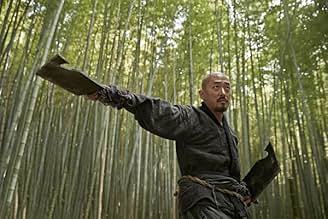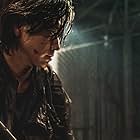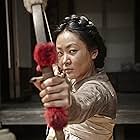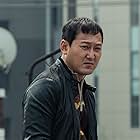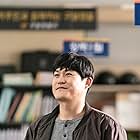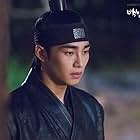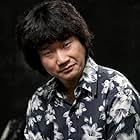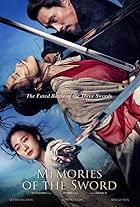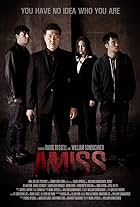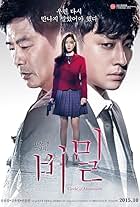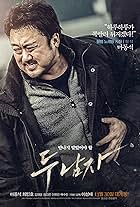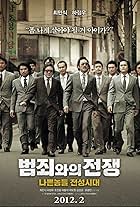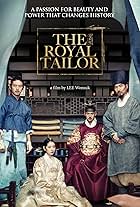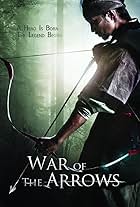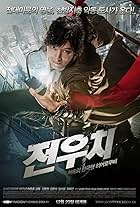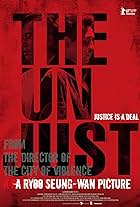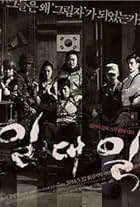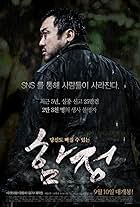VALUTAZIONE IMDb
6,8/10
3948
LA TUA VALUTAZIONE
Segui questo gruppo di miliziani che si rivolta contro una nobiltà ingiusta.Segui questo gruppo di miliziani che si rivolta contro una nobiltà ingiusta.Segui questo gruppo di miliziani che si rivolta contro una nobiltà ingiusta.
- Premi
- 11 vittorie e 11 candidature
Trama
Lo sapevi?
- QuizThis is the fourth collaboration Jong-Bin Yun and Jung-Woo Ha. The other three title are: Yongserbadji Mothan Ja, Biseuti Boijeu and Bumchoiwaui Junjaeng: Nabbeunnom.
Recensione in evidenza
Kundo is an odd but charming amalgamation of influences. While very strongly identifying itself as a martial arts film, much like The Good, the Bad, the Weird (2008) in its heart it's a western. Its hero, Dolmuchi certainly lends himself to western tropes; a downtrodden man turned outlaw seeking vengeance. Add to that a Robin Hood-esque sub-plot involving a band of larger-than-life rebels and you have yourself one of the most intriguing South Korean imports since Mother (2009).
All is not well in Joseon dynasty Korea (approximately mid-19th century). There are consistent strife between the the ruling aristocracy and the poverty stricken farmers and artisans that struggle to survive. During this time Jo Yoon (Kang) is taken from the brothel he was born in, to the house of his father (Joo) and told he is the heir to his fortune; that is until his half-brother comes along. Thus, Jo Yoon slides into all-consuming evil and claws his way back up to power after the "death" of his brother. His brother's pregnant wife (Kkobbi) avoids harm so Jo Yoon hires a lowly butcher Dolmuchi (Ha) to finish the job. Dolmuchi refuses and his family is killed as a result. Thus the game of good and evil is set with Dolmuchi siding with a team of bandits who steal from the rich to give to the poor.
Members of the the gang of bandits are introduced with flashy tile cards while riding in the saddle which emulates the slap-dash styling that defined Sergio Leone's most iconic westerns. You get a very clear sense of the personality of the bandits from the get-go and director Jong-Bin Yin wisely uses this short hand so we feel invested in their fate while concentrating solely on the struggles, both internal and external, of Jo Yoon and Dolmuchi. Dong-Won Kang is rapturous with his calm, concise words and demeanor. The concubine's son turned nobleman wears white and darts with the steady grace of a samurai yet his preening has a very dark and sinister side. Meanwhile Jung-Woo Ha's Dolmuchi is as coarse as a bag of rice with his constant swearing and Fairbanksian swagger. Despite receiving a burn on his head after the death of his family, Dolmuchi keeps a sense of humor and takes relish in relieving noblemen from their top knots. The commonality between the two is a seething anger that threatens to undo their progress.
Despite it's epic sweep and solid acting, Kundo may ultimately have trouble putting butts in the seats due to its fighting sequences. The fights are well choreographed don't get me wrong, but there's nothing that stands out apart from perhaps the final showdown. Even then Jo Yoon is put at so much of a disadvantage one can't help but speculate that if he had the use of all his limbs and faculties he would once again be able to easily defeat Dolmuchi. In addition there are some scenes that seem to conflict in tone with one another for no apparent reason. Then again it might just be a product of film grammar from another culture I have yet to truly understand.
All in all though, Kundo is a riveting Korean epic with a story that rivals the best of western mythology. There is some strong character work and directorial choices that sets it apart from others of its ilk and while the fighting scenes were short of spectacular, the bandits and their unique skills sets stop them from becoming monotonous.
All is not well in Joseon dynasty Korea (approximately mid-19th century). There are consistent strife between the the ruling aristocracy and the poverty stricken farmers and artisans that struggle to survive. During this time Jo Yoon (Kang) is taken from the brothel he was born in, to the house of his father (Joo) and told he is the heir to his fortune; that is until his half-brother comes along. Thus, Jo Yoon slides into all-consuming evil and claws his way back up to power after the "death" of his brother. His brother's pregnant wife (Kkobbi) avoids harm so Jo Yoon hires a lowly butcher Dolmuchi (Ha) to finish the job. Dolmuchi refuses and his family is killed as a result. Thus the game of good and evil is set with Dolmuchi siding with a team of bandits who steal from the rich to give to the poor.
Members of the the gang of bandits are introduced with flashy tile cards while riding in the saddle which emulates the slap-dash styling that defined Sergio Leone's most iconic westerns. You get a very clear sense of the personality of the bandits from the get-go and director Jong-Bin Yin wisely uses this short hand so we feel invested in their fate while concentrating solely on the struggles, both internal and external, of Jo Yoon and Dolmuchi. Dong-Won Kang is rapturous with his calm, concise words and demeanor. The concubine's son turned nobleman wears white and darts with the steady grace of a samurai yet his preening has a very dark and sinister side. Meanwhile Jung-Woo Ha's Dolmuchi is as coarse as a bag of rice with his constant swearing and Fairbanksian swagger. Despite receiving a burn on his head after the death of his family, Dolmuchi keeps a sense of humor and takes relish in relieving noblemen from their top knots. The commonality between the two is a seething anger that threatens to undo their progress.
Despite it's epic sweep and solid acting, Kundo may ultimately have trouble putting butts in the seats due to its fighting sequences. The fights are well choreographed don't get me wrong, but there's nothing that stands out apart from perhaps the final showdown. Even then Jo Yoon is put at so much of a disadvantage one can't help but speculate that if he had the use of all his limbs and faculties he would once again be able to easily defeat Dolmuchi. In addition there are some scenes that seem to conflict in tone with one another for no apparent reason. Then again it might just be a product of film grammar from another culture I have yet to truly understand.
All in all though, Kundo is a riveting Korean epic with a story that rivals the best of western mythology. There is some strong character work and directorial choices that sets it apart from others of its ilk and while the fighting scenes were short of spectacular, the bandits and their unique skills sets stop them from becoming monotonous.
- bkrauser-81-311064
- 20 gen 2016
- Permalink
I più visti
Accedi per valutare e creare un elenco di titoli salvati per ottenere consigli personalizzati
- How long is Kundo: Age of the Rampant?Powered by Alexa
Dettagli
- Data di uscita
- Paese di origine
- Sito ufficiale
- Lingua
- Celebre anche come
- Kundo: Age of the Rampant
- Luoghi delle riprese
- Aziende produttrici
- Vedi altri crediti dell’azienda su IMDbPro
Botteghino
- Lordo Stati Uniti e Canada
- 280.958 USD
- Fine settimana di apertura Stati Uniti e Canada
- 120.857 USD
- 31 ago 2014
- Lordo in tutto il mondo
- 35.941.291 USD
- Tempo di esecuzione2 ore 17 minuti
- Colore
- Mix di suoni
- Proporzioni
- 2.35 : 1
Contribuisci a questa pagina
Suggerisci una modifica o aggiungi i contenuti mancanti

Divario superiore
What is the French language plot outline for Kundo: Min-ran-eui si-dae (2014)?
Rispondi







